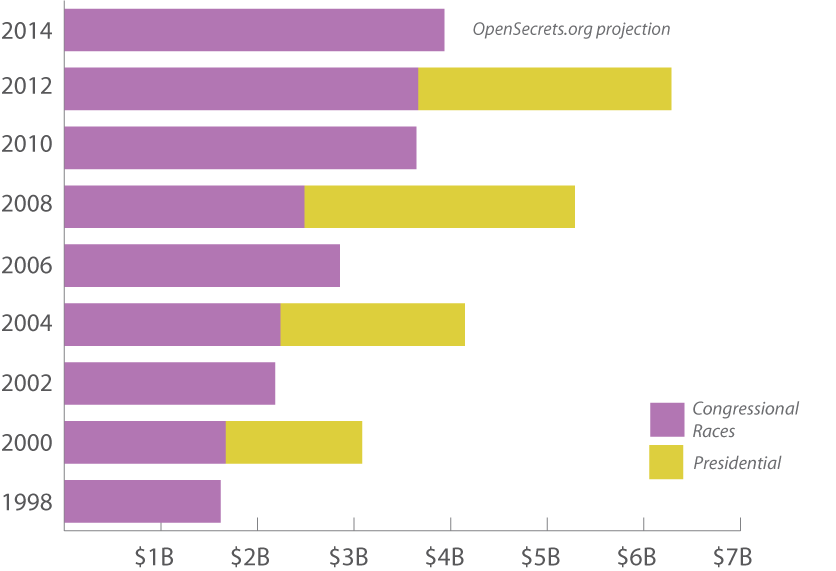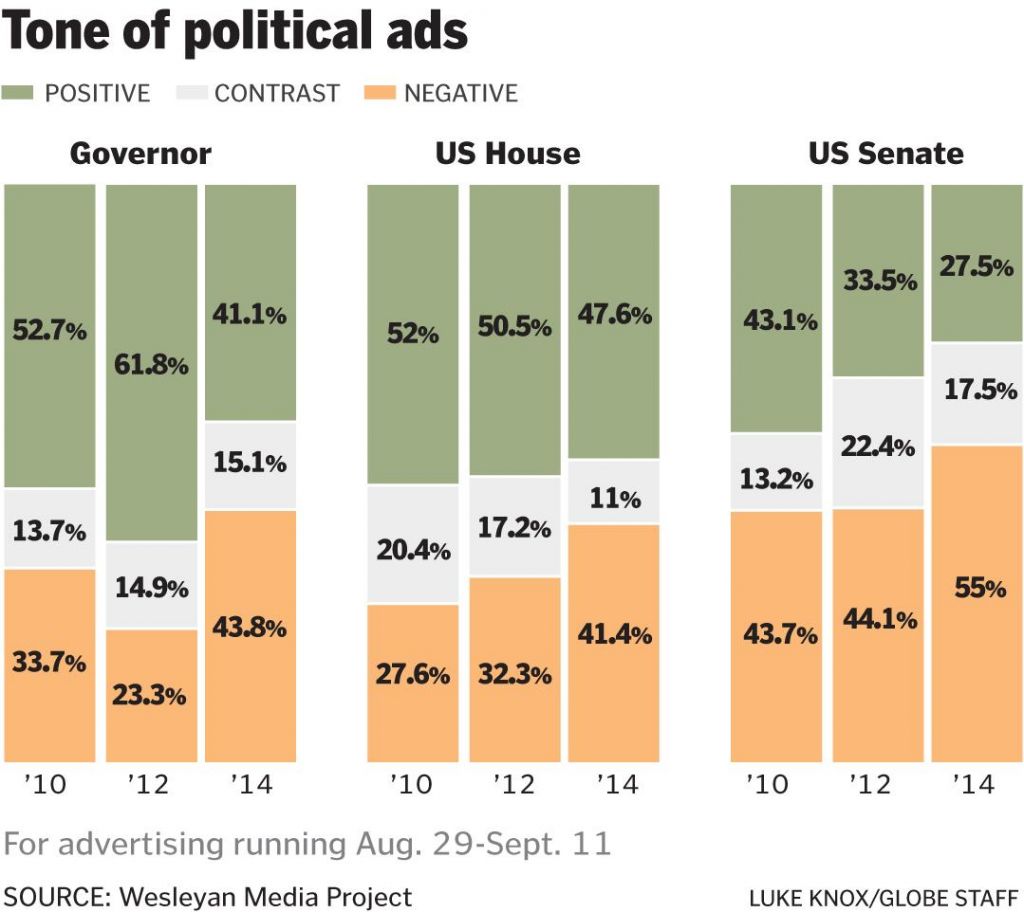We’re less than two weeks away from a midterm election that could decide which party controls the Senate, and ultimately shape the final two years of Barack Obama’s presidency.
It’s the first complete midterm cycle since the Supreme Court’s ruling in Citizens United — it came down just nine months before the 2010 election — and the first since another key campaign finance case, McCutcheon v. FEC. Mountains of money are flooding key races in the most expensive non-presidential campaign in history.
To keep you up to date with the latest, we’ve rounded up some key campaign finance stories from the past week.
$4 Billion
According to the Center for Responsive Politics’ Open Secrets blog, “almost $4 billion will be spent for this year’s midterm election,” making it “by far the most expensive midterm ever.”

(Credit: OpenSecrets.org)
When all the dollars are tallied, The Center for Responsive Politics expects Republicans and conservative-leaning outside groups to outspend Democrats and their “independent” backers by $160 million. Here’s the breakdown of how much will be spent by parties versus super PACs and other outside groups:
The candidates and parties alone will combine to spend about $2.7 billion, while outside groups will likely spend close to $900 million on their own — a figure that veers close to the $1.3 billion spent by outside groups in 2012, when the hyper-expensive presidential race was fueling the fire.
Outside Spending Makes Politics Meaner
Jessica Meyers reports for The Boston Globe that “in one of the most negative midterm elections, an unprecedented amount of funding comes from secret donors.”
While vitriolic ads are hardly new, voters this year have witnessed an inundation. Nearly three quarters of Senate ads in a two-week period between August and September showed a candidate in a negative light. This outpaced the last two cycles at that time, according to Wesleyan Media Project, a nonpartisan group that researches advertising in elections…
“The increased presence of outside spending is one of the reasons why the elections in the last two cycles have been so negative,” said Michael Franz, co-director of the Wesleyan project. “Outside groups don’t do positive advertising.”
This chart shows an increasing share of negative advertising over the past few cycles:
Donors’ Interests Can Trump Parties’ Priorities
National Journal correspondent Scott Bland reports that a major Democratic super PAC, the House Majority PAC, mystified observers this week by pulling nearly a quarter-million dollars of ad spending out of a close race in New Jersey’s 3rd District and moving it into the 1st District, which is a very safe, deep-blue seat. Bland writes:
Why move the money? A look at House Majority PAC’s fundraising from last month appears to hold the answer. The numbers suggest the group is now running ads in the 1st District because allies of well-connected Democratic candidate Donald Norcross gave them money specifically to do that.
House Majority PAC operates as the unofficial super PAC version of the Democratic Congressional Campaign Committee, looking after Democratic candidates in tough races. This move doesn’t fit into their typical strategy, but it does match up with some of their newest donors’ local aims.
In September, House Majority PAC took in six donations, totaling $270,000, from labor unions and businesses tied in various ways to Donald Norcross, a New Jersey state senator.
State Senator Donald Norcross’s 5th State Senate District overlaps with the 1st Congressional District; the money appears to be for promoting Norcross rather than fighting for a competitive seat in the US House of Representatives.
A Novel Argument Against Our Wild West Campaign Finance System
The Supreme Court has based a long series of decisions undermining campaign finance limits on the First Amendment’s guarantee of free speech. In a landmark 1976 decision, Buckley v. Valeo, the court established that giving money to candidates was a form of political speech, but allowed it to be limited. More recently, the court has struck down most of those limits.
But at The Brennan Center for Justice’s blog, constitutional attorney John Bonifaz, president of Free Speech for People, argues that “there is another part of the US Constitution which ought to be applied in any scrutiny of the campaign finance question: the Equal Protection Clause of the Fourteenth Amendment.”
Through that lens, we can see that an exclusionary system which is open only to the wealthy few and which plays an integral role in our elections violates the equal protection rights of those locked of the process. Two lines of Supreme Court rulings, taken together, make this case.
First, the Supreme Court has made clear that wealth discrimination in the political process is prohibited under the Equal Protection Clause…
The second line of rulings held that parties’ exclusionary, whites-only primary processes violated the Equal Protection Clause even though they were conducted by private organizations rather than the government. Bonifaz offers much more detail in his essay.
Judicial Races Raise Conflict-of-Interest Questions
James Oliphant writes in National Journal that “39 states elect some portion of their Appellate Court or high-level trial judges,” and warns: “as judicial candidates increasingly resemble their office-seeking cousins, critics are gravely concerned that the judiciary is being cheapened, that public trust is eroding the same way it has with other branches of government.”
The FEC Is Overwhelmed With Disclosure Reports
The Federal Election Commission compiles candidates’ disclosure data and makes it available to the public on its website, FEC.gov. But this year’s battle for the Senate has generated so many reports that the system has been overwhelmed. Here’s the message posted on the site’s “Candidate and Committee Viewer” Friday afternoon:
Bipartisan Opposition to Dark Money in Arizona
Anastasia Reynolds reports for the Tucson Sun-Sentinel that both candidates for secretary of state in Arizona want to crack down on dark money.
With shadowy nonprofit groups expected to spend millions this year to influence Arizona voters without disclosing the sources of their money, both candidates for the state office overseeing elections are offering plans to address the practice.
Democrat Terry Goddard and Republican Michele Reagan say they want laws taking a harder line with so-called dark money groups and requiring them to register with the Secretary of State’s Office.
Dark Money Floods Colorado Senate Race
Michael de Yoanna reports for Colorado Public Radio that “tens of millions of dollars” are flowing into the state’s hotly contested race between incumbent Democrat Mark Udall and his Republican challenger, Rep. Corey Gardner. De Yoanna also looks at Colorado’s complex campaign finance disclosure laws, and speaks to incoming FEC Chair Ann Ravel about how partisan gridlock is preventing the agency from enacting much-needed new disclosure rules.

This work is licensed under a Creative Commons Attribution-NoDerivatives 4.0 International License.




